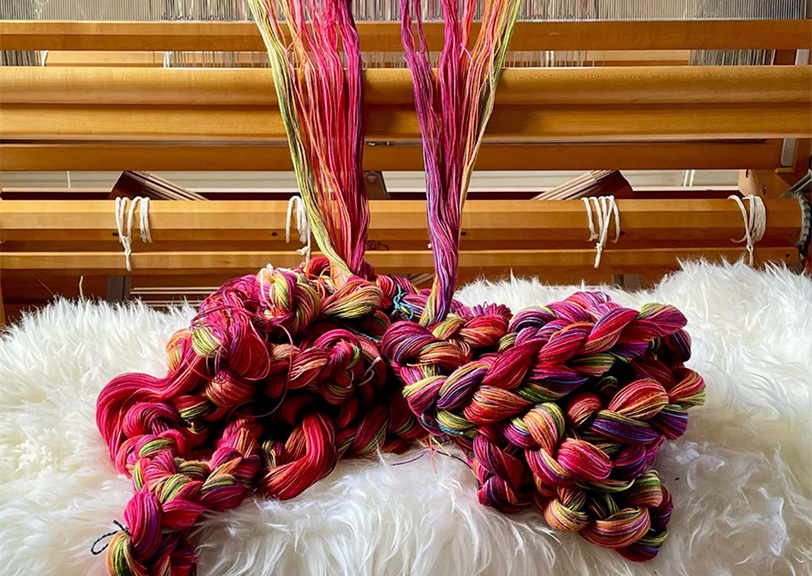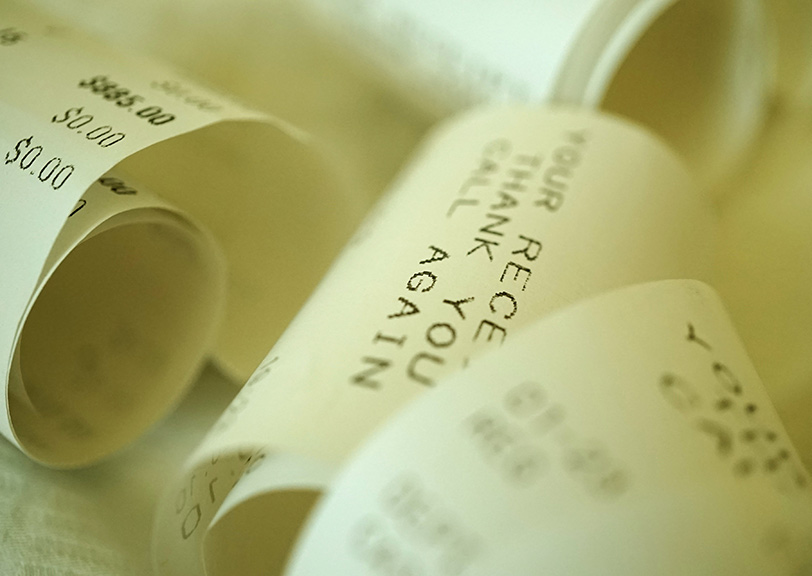ENTER YOUR EMAIL TO RECEIVE OUR WEEKLY NEWSLETTER
Foods that Hurt, or Help, If You’re Feeling Anxious
Here’s a guide for keeping ‘stressful’ food and drink off your menu.
By Rona Cherry
As we age, we face many life changes that can bring on anxiety—health issues, finances, loss of friends and family are just a few of the many issues we all face. But keep in mind that age isn’t the only culprit making us feel anxious. More and more of us say they are feeling unsettled and jittery—perhaps in response to the frightening news we hear each day: The threat of climate change, war, the loss of health care and, of course, those crazy Presidential tweets. A recent Upper East Side Patch article was headlined, “Hey, NYC: Here’s What to Do If We Get Nuked.” And in a recent New York Times article titled “An Anxious Nation,” one woman is quoted as saying: “If you’re a human being living in 2017 and you’re not anxious, there’s something wrong with you.”
You already know that anxiety can affect your diet if you find yourself scraping the bottom of a quart of ice cream at the end of a long day, or drinking a glass (or two) of wine or beer to calm your nerves, not realizing that what you eat or drink can increase your anxiety instead of reducing it. To help you stay as calm as possible, listed below are foods that might be fueling your anxiety and also foods that can reduce anxiety.
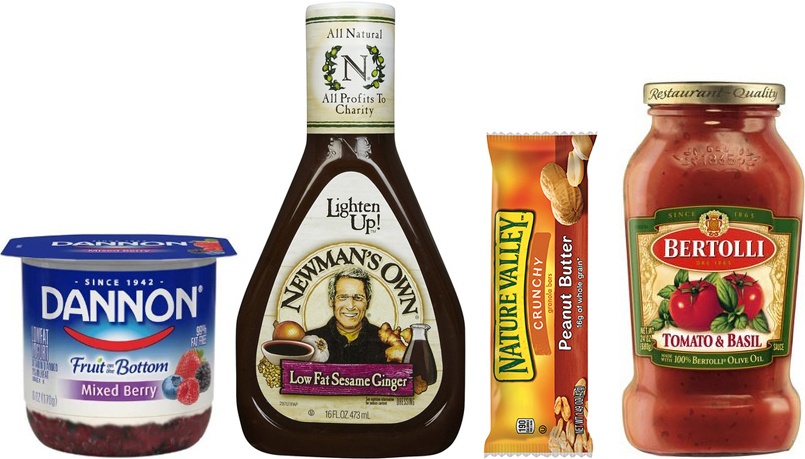
No-No’s: Popular foods that have more sugar than you think. Dannon Fruit at the Bottom yogurt has a whopping 24 grams of sugar; Newman’s Own salad dressing has 4 grams per serving; Nature Valley granola bar has 5 grams per bar; Bertolli tomato sauce, 12 grams per serving.
. . . . . . . . . . . .
#1 Artificial and Refined Sugars
According to the Pew Research Center the average American still eats over 77 pounds of sugar each year. But this isn’t only because we’re stuffing our faces with foods filled with sugar, such as cookies, cakes and candies. Eating too much sugar is primarily due to food manufacturers who manage to sneak sugar into many foods in an effort to make them taste better. A 5.3-ounce cup of Dannon fruit-on-the-bottom strawberry yogurt, for instance, contains about 24 grams of sugar—the equivalent of slightly more than five teaspoons of sugar. Add to this the many processed foods, such as pasta sauces, ketchup, salad dressings, instant soups, canned fruits, soft drinks, and even frozen dinners that contain alarming amounts of sugar.
“Sugar is the most ‘stressful’ food because it causes a roller coaster effect on blood sugar or glucose, which can cause anxiety when it plummets,” says Dr. Ronald Hoffman, a New York City medical nutritionist and host of the “Intelligent Medicine” radio show and podcast. When your blood sugar levels are irregular and drop, the hormones cortisol and adrenalin are automatically released, often causing anxiety.
Anti-Anxiety Suggestion: Read food labels carefully. Equate ingredients such as corn syrup, barley malt, dextrose, dehydrated cane juice with just plain sugar. “If any of them are among the first five items on your ingredients list, that food item is almost assuredly high in sugar,” writes Nutritionist Trudy Scott in The Anti-Anxiety Food Solution.
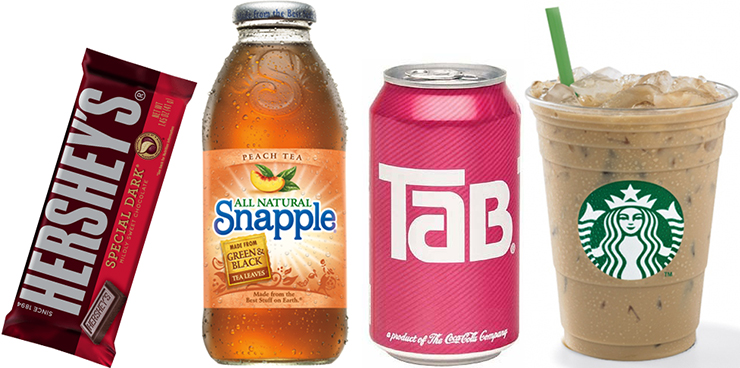
Anxiety enablers: There are 20 milligrams of caffeine in a Hershey’s Special Dark bar; Snapple Tea has 37 mgs; Tab has 45 mgs; and a Starbuck’s Tall Latte has 75 mgs. Information for caffeine amounts came from CaffeineInformer.com.
. . . . . . . . . . . .
#2 Caffeine
Don’t worry. We’re not about to tell you to ditch your morning cup of coffee or other caffeinated drinks. In fact, according to recent studies in the Annals of Internal Medicine, drinking more coffee, even decaffeinated coffee, can lead to long-term health benefits and a longer life. However, if you’re feeling anxious, too many cups of caffeine in coffee or various teas, including black tea and yerba mate—may be partly to blame. Caffeine, particularly in those individuals most sensitive to it, can contribute to anxiety and related symptoms including insomnia, irritability, heart palpitations and even panic attacks. That’s because caffeine has a stimulant effect on the central nervous system and triggers a jolt of the stress hormone cortisol.
Anti-Anxiety Suggestion: But the good news is there are a number of delicious herbal teas such as lemon-ginger, mint, chamomile and rooibos teas that can help bring natural calm to your day. If you drink a lot of coffee or other caffeinated drinks, just switching daily to one or more cups of decaffeinated herbal teas may help reduce anxiety.
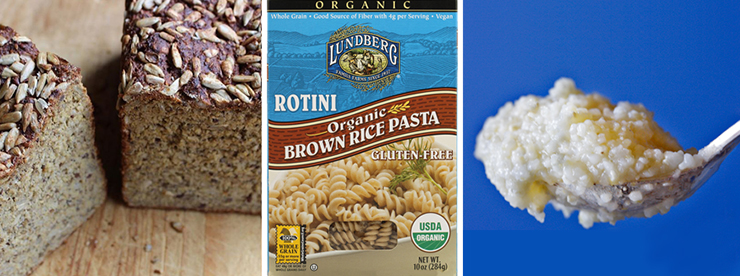
The Good Guys: Le Pain Quotidien Organic Super Seed Gluten-Free Bread; Lundberg Organic Brown Rice Pasta; Anson Mills Antebellum Corn Grits.
. . . . . . . . . . . .
#3 Gluten
Not long ago, gluten-free living was reserved mainly for people with celiac disease and those described as “gluten-sensitive” who made do with products that tasted more like sawdust than real food. But times have changed. And gluten-free nutrition is now a movement that is sweeping the nation because gluten is a protein found in many grains, including wheat, barley, rye and popular foods such as bagels, bread, pasta, some cereals and most baked goods. But gluten can also trigger anxiety.
Although some medical experts believe that the “dangers” of gluten have been overstated, others claim that removing gluten is a positive overall health choice. “[Gluten and dairy] are the main allergens and foods that cause bad brain reactions,” writes Mark Hyman, M.D., author of The UltraMind Solution. “Stopping these foods can be life-changing for the majority of those with brain and mood problems.”
Anti-Anxiety Suggestion: There are now plenty of gluten-free options available in mainstream grocery stores, such as Whole Foods and Trader Joe’s. And since grains are important for good health, some popular gluten-free options are brown rice, quinoa, millet, amaranth, cornmeal and oats that are not processed in a facility that also processes wheat.
. . . . . . . . . . . .
Anti-Anxiety Foods
Eating a healthy diet composed mostly of fruits, vegetables, meat, fish and whole grains can lower your odds of getting major chronic ailments—such as heart disease—and it is also a way of warding off anxiety. By eating the right foods, you can lower the amount of anxiety you experience—and possibly improve your mood.
“Omega-3 fatty acids from fish and nuts support optimal mood,” said Dr. Hoffman. He points out that foods with magnesium B vitamins and antioxidants can also help you deal with stress.
Add these anti-anxiety foods to your shopping list:
Asparagus (an excellent source of the B vitamin folic acid)
Avocado (contains potassium, which naturally helps lower blood pressure and B vitamins)
Blueberries (rich in antioxidants)
Fish such as halibut (magnesium), salmon (omega-rich)
Grass-fed beef and beef liver (B vitamins)
Nuts (especially almonds and walnuts)
Oranges (folate and vitamin C)
Turkey (containing tryptophan, a precursor to the neurotransmitter serotonin, which helps you feel calm).
. . . . . . . . . . . .
Rona Cherry has written about health and wellness for The New York Times Magazine, Ladies’ Home Journal, Vegetarian Times, and many other publications. She was the editor-in-chief of several national magazines, including Fitness and Longevity. She is currently an editorial and PR consultant with regional publications and nonprofits.
You may enjoy other NYCitywoman stories by Rona Cherry
Keeping Your Memory Sharp as You Age
Top Wig Boutiques in New York City
Memo to Trump: Naps Are Good For You!



